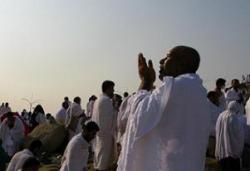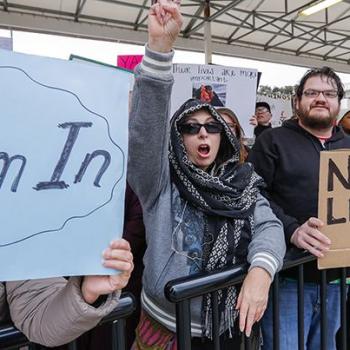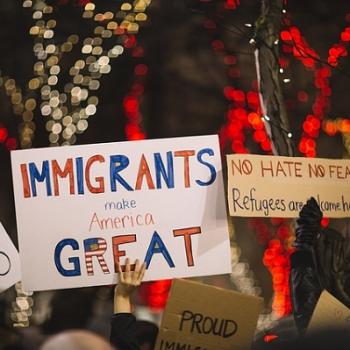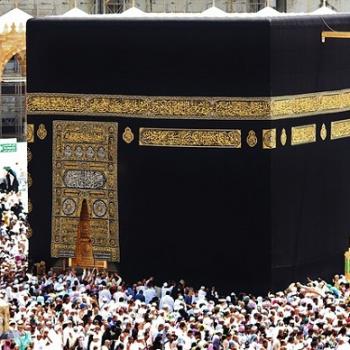This is a guest post from Hesham Hassaballa, who will soon be joining the Patheos family as a columnist.
 October 28 marked the first day of the last month of the Islamic calendar, Dhul Hijjah, and it marked the beginning of the Hajj season. Now, millions of elated pilgrims are descending upon the valley of Mecca to perform this truly amazing, once-in-a-lifetime event. I was blessed to perform the pilgrimage in 2003, and it was the most powerful spiritual experience of my life.
October 28 marked the first day of the last month of the Islamic calendar, Dhul Hijjah, and it marked the beginning of the Hajj season. Now, millions of elated pilgrims are descending upon the valley of Mecca to perform this truly amazing, once-in-a-lifetime event. I was blessed to perform the pilgrimage in 2003, and it was the most powerful spiritual experience of my life.
When everyone is dressed in the ihram garb, which are two white unstitched cloths (for men, and any loose, full-coverage garments for women), they are commanded by God to avoid hurting or harming anyone in thoughts and deeds. At this time, more than any other I have ever experienced, one can sense the ideal nature of the ummah, or global Muslim community: An entire human family working together in peace and harmony.
As I and the rest of the world witnessed the recent release of Israeli soldier Gilad Shalit, after a relentless pursuit by not only his family, but the entire nation of Israel and much of the Jewish Diaspora, I lamented the state of our own ummah. Sadly, I did not think that we, as Muslims, have the same sort of care for our own as Israel had for Gilad Shalit.
A natural question that comes out of this lament is: What can we do about it? Is there anything that we, as individual Muslims, can do to help make the ummah better? Yes, we can support the myriad of relief organizations that tragically have no shortage of work to do helping the poor and drown trodden of the Muslim world. But is there something beyond this that we can do to make the ummah act as if it is wearing the ihram garb?
Indeed, there is.
We can begin by greeting each other with the greeting of “peace.” The Prophet Muhammad (pbuh) said, “Spread greetings of peace, feed (the poor and needy), behave kindly to your relatives, offer prayer when others are asleep, and you will enter Paradise in peace.” Reportedly, he said this soon after he arrived in Madinah, where he built the first Muslim ummah. And notice, the first thing he said was to “spread greetings of peace.”
We must do the same. So many times, I have noticed that when I see a fellow Muslim and say, “Assalamu-alaikum,” I either get no response at all or a muffled grunt at best. Sometimes, I do get a response and even a smile, and the connection I make with that brother or sister is amazing. In fact, when we say, “Assalamu-alaikum,” we are doing something quite profound: We are asking God to send down His peace upon you. It is one of the best things that we can ask God to do for someone.
We must do more of this. We must say, “Peace,” to every Muslim we see, and whenever we are greeted by a fellow Muslim, we must — I repeat, must — respond in kind. It is fulfilling the command of God: “But when you are greeted with a greeting [of peace], answer with an even better greeting, or [at least] with the like thereof. Verily, God keeps count indeed of all things. (4:86)”
When I visited Cairo over five years ago, everyone said “Assalamu-alaikum” to everyone else. Even Christians say “Assalamu-alaikum.” It was devoid of any real meaning for me. Although the greeting was used constantly, I felt there was a lack of meaning behind it. But here in the West, when I see a fellow Muslim smile and say “Assalamu-alaikum,” it means something very special, whereby I am making a connection to a fellow believer and human being and praying for their peace from the Lord.
God tells us: “Verily, God does not change men’s condition unless they change their inner selves. (13:11” The change must begin with us, and the thing that we can do right now is to “spread peace” amongst ourselves. When we all start to do this, the bonds of our brotherhood and sisterhood will grow in strength and quality. And, God willing, the state of our ummah will improve for the better.











